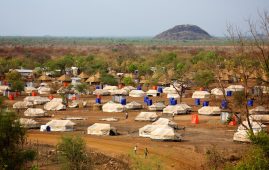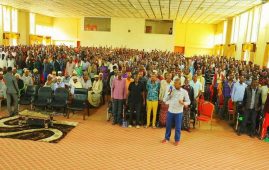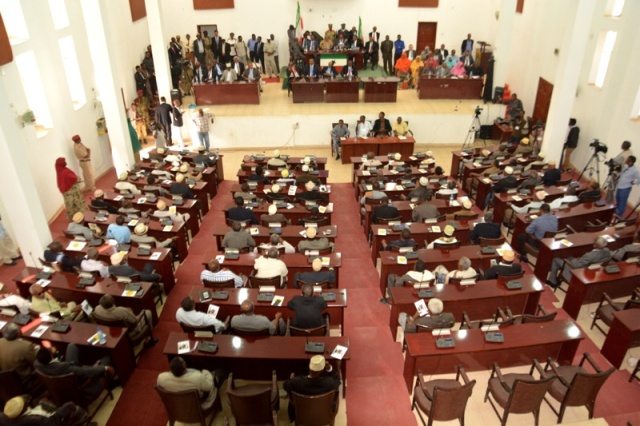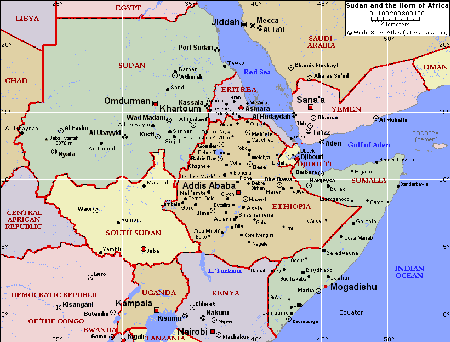Four leaked Cables of US Embassy Addis Ababa, dated Aug., Nov.’09, Dec. 2009 and Feb. 2010, reveal strong opposition to the Ethiopian Biosafety Proclamation and a persistent lobby to scrap it.
The Cables, evidently driven by US corporate interests in promoting Genetically Modified foods, blame the Ethiopian Environmental Protection Authority(EPA) and its Director General. Dr. Tewoldeberhan Gebregziabhere for the law.
The first Cable, written on Aug. 25/09, even before the Biosafety Proclamation went to print, is titled ‘GOE passes restrictive Biosafety Law, But is interested in BT Cotton’.
It Clams:
Ethiopia recently enacted highly restrictive biosafety legislation that could significantly impact the importation of bioengineered seeds, food commodities, and processed foods. Ethiopia’s Environmental Protection Authority (EPA) is admittedly unprepared to implement the new legislation, owing to a lack of laboratory facilities, technical expertise, and manpower. Although the EPA’s leadership is ideologically opposed to the use of bioengineered crops, the EPA will likely be pressured to approve trials of such crops where they could promote growth in key export sectors, namely cotton.
This new biosafety law is far-reaching and highly restrictive, and has clearly been influenced by GoE officials opposed to biotechnology. It appears that sufficient political will exists to begin trials of transgenic crops in sectors where they could promote exports – a key GoE goal. However, given the ideological bent of the current EPA leadership, it is likely that the GoE will restrict imports of bioengineered food and other crops that are not as closely tied to the GoE’s development agenda.
The second Cable, dated Nov.04/09 was written as an input to US National Trade Estimate Report of 2010 concerning Sanitary and Phytosanitary and standards-related foreign trade barriers.
The Cable notes that the Bio Safety Proclamation is more stringent that the relevant international agreement, the Cartagena Protocol. It describes the Proclamation as follows:
The biosafety law grants the Ethiopian Environmental Protection Authority (EPA) the power to regulate the making or use of any MOs in "teaching, research, production, import, export, transit, release, contained production, transport, placing on the market, or use as pharmaceutical, as food, as feed, or for processing." According to the law and directives, an Advanced Informed Agreement (AIA) must be obtained before a viable or non-viable MO may enter Ethiopia. The AIA application process includes submission of product characterization information, environmental and human health risk assessments, social and economic impact assessments, and risk management plans. By contrast, the Cartagena Protocol only requires an AIA for living modified organisms intended for direct release into the environment, not for those intended for food, feed, or processing.
The third Cable, written on Dec. 24/09, is a funding request ‘to educate high level GoE decision-makers about agriculture biotechnology’.
The Cable, titled ‘Ethiopia Biotechnology outreach funding request’, describes a USD 5,500.00 three-days event with ‘expert speakers’ to be invited ‘from South Africa, Egypt, Kenya, and possibly the U.S.’.
TARGET AUDIENCES: High-level GoE decision makers, particularly in the Ministry of Agriculture and Rural Development, Ministry of Trade and Industry, Environmental Protection Authority, and Prime Minister’s Office.
AG-BIOTECH ISSUES TO BE ADDRESSED: Biotechnology and its impact on agricultural productivity and agribusiness in the African context. Promoting agriculture biotechnology with regard to domestic food security and agricultural products for export. Regulatory frameworks in neighboring countries, lessons learned in the implementation of biosafety legislation.
PURPOSE AND IMPACT: To educate high level GoE decision makers about agriculture biotechnology and the potential implications of the country’s new biosafety legislation.
The three-days meeting, dubbed ‘workshop’, took place about two months later, according to the fourth Cable, dated Feb 09/2010.
The Cable describes the discussions as follows:
* The Ethiopian Ministry of Agriculture and Rural Development (MoARD) held a "National Workshop on Biotechnology" with support from the U.S. Mission from February 1-3, 2010 in Addis Ababa. The event was well-attended, and generated healthy debate on the 2009 biosafety law, including from GOE officials openly opposed to the legislation, and the future of agriculture development in Ethiopia. However, during opening and closing comments at the workshop, MoARD State Minister Abera Deressa sent mixed messages about his ministry’s support for reviewing or amending the biosafety law. End summary.
* In a surprising departure from the reserve often shown in Ethiopian culture, several Ethiopian participants from AAU [Addis Ababa University] and EIAR [Ethiopian Institute of Agricultural Research] candidly challenged the presenter from the Environmental Protection Authority (EPA), which drafted the biosafety law and is viewed as the strongest institutional opponent of agriculture biotechnology in the government. EPA Director General Dr. Tewolde Berhan, who was scheduled to present on the legislation, did not attend the conference. The lone EPA participant, from the agency’s legal division, left immediately after his presentation.
* Ethiopian government officials and agencies clearly hold divergent views on biotechnology, ranging from the EPA’s firm opposition to biotechnology research and development, through MoARD’s flip-flopping, to the EIAR’s keen interest in harnessing modern science to address Ethiopia’s chronic food insecurity. State Minister Abera offered no insight into his dramatic change of heart during the workshop. Post[the Embassy] assesses he was influenced by politics, rather than science. The biotechnology workshop generated healthy debate on the 2009 biosafety law and the future of agriculture development in Ethiopia, but it increasingly appears that engaging officials at the most senior levels will be necessary to initiate a meaningful review of the law and its consequences.
No surprise that Dr. Tewoldeberhan skipped the US-funded lobby against the Biosafety Proclamation. He is known for advancing stricter controls on Genetically Modified Organisms (GMO) in international forums, let alone compromise in his own turf.
Read the full text of the four Cables below.
*****************
Notice that: The highlights above are hastily prepared and I will present a detailed discussion of Dr. Tewoldeberhane’s arguments, the Cartagena Protocol, and the Biosafety Proclamation in the coming weeks.
Until then, you may Watch this video to learn about the scam behind the so-called bio-technology.
*******************
Reference ID – 09ADDISABABA2065
Created – 2009-08-25 08:13
Released – 2011-08-26 00:00
Classification – UNCLASSIFIED//FOR OFFICIAL USE ONLY
Origin – Embassy Addis Ababa
VZCZCXRO0316
PP RUEHROV
DE RUEHDS #2065/01 2370813
ZNR UUUUU ZZH
P 250813Z AUG 09
FM AMEMBASSY ADDIS ABABA
TO RUEHC/SECSTATE WASHDC PRIORITY 5984
INFO RUCNIAD/IGAD COLLECTIVE PRIORITY
RUEHRC/DEPT OF AGRICULTURE WASHINGTON DC PRIORITY
RUCPDOC/DEPT OF COMMERCE WASHDC PRIORITY
UNCLAS SECTION 01 OF 02 ADDIS ABABA 002065
SENSITIVE
SIPDIS
DEPT FOR EEB/TPP/ABT JACK BOBO
PASS TO USAID FOR JOSETTE LEWIS, LARRY BEACH, SAHARAH MOON
CHAPOTIN
ALSO USTR FOR PATRICK COLEMAN
DEPT OF COMMERCE FOR ITA MARIA RIVERO
NAIROBI FOR FCS AND FAS
E.O. 12958: N/A
TAGS: TBIO SENV EAGR ETRD EAID ET
SUBJECT: GOE PASSES RESTRICTIVE BIOSAFETY LAW, BUT IS INTERESTED IN BT COTTON
REF: ADDIS ABABA 1389
SUMMARY
——-
¶1. (SBU) Ethiopia recently enacted highly restrictive biosafety legislation that could significantly impact the importation of bioengineered seeds, food commodities, and processed foods. Ethiopia’s Environmental Protection Authority (EPA) is admittedly unprepared to implement the new legislation, owing to a lack of laboratory facilities, technical expertise, and manpower. Although the EPA’s leadership is ideologically opposed to the use of bioengineered crops, the EPA will likely be pressured to approve trials of such crops where they could promote growth in key export sectors, namely cotton. End summary.
BIOSAFETY LAW RESTRICTIVE, FAR-REACHING
—————————————
¶2. (U) The Ethiopian parliament recently passed highly restrictive biosafety legislation, establishing broader and more stringent controls than are called for under the Cartagena Protocol on Biosafety. The stated objective of the Biosafety Proclamation of 2009 is to protect biodiversity, as well as human and animal health, from "the adverse effects of modified organisms." The law grants the EPA the power to regulate the making or use of any "modified organism" in "teaching, research, production, import, export, transit, release, contained production, transport, placing on the market, or use as pharmaceutical, as food, as feed, or for processing." It makes no distinction between living organisms and products that are not capable of reproducing (e.g., processed foods), or between transgenic organisms and bioengineered organisms that do not contain genetic material from another species. The law also prohibits the use of the phrase "may contain modified organisms," requiring instead a declaration that a product either does or does not contain modified organisms.
¶3. (SBU) In a public statement, EPA Director General Dr. Tewolde Berhan Gebregziabhere described the Biosafety Proclamation as "based on the international biosafety law (i.e., the Cartagena Protocol), with local characteristics." Wondwossen Sintayehu, EPA Director of Environmental Law and Policy, told EconOff that Dr. Tewolde was the driving force behind the new law, and that the bill he initially proposed was even more restrictive than the resulting legislation. (Note: Dr. Tewolde previously represented African nations during negotiations on the Cartagena Protocol, where he opposed the use of bioengineered crops in developing nations. End note.) Gebremedhin Birega, Director of the Eco Consumer Association, an environmental group that lobbied for the bill, separately told EconOff that the Ethiopian government’s (GoE) Environmental Council (which drafted the bill and is comprised mainly of GoE officials) is largely opposed to the importation of bioengineered organisms, but was wary of appearing "anti-science" when drafting the new law.
EPA HAS LIMITED IMPLEMENTATION CAPACITY
—————————————
¶4. (SBU) The legislation, which has already entered into force, requires the EPA to approve or deny all applications for the use of modified organisms in Ethiopia, and further requires the EPA to establish a National Biosafety Clearing-House to study bioengineering and assist the EPA in making its decisions. According to the EPA’s Wondwossen, while the EPA "must now process applications, legally speaking," it is not capable of doing so. Only two EPA employees currently specialize in biosafety, and Wondwossen stated that there are currently no facilities in Ethiopia that meet the standards for studying or conducting trials of modified organisms that are set forth in the draft implementing regulations. Wondwossen described implementation of these regulations as "very problematic," and explained that in order to be approved, an applicant would be required "to prove to us (the EPA) that there is no risk" to biodiversity or to human or animal health from the bioengineered product. He further noted that while the law does not distinguish between food products and non-edible
ADDIS ABAB 00002065 002 OF 002
goods, the EPA would scrutinize food products more closely.
¶5. (SBU) Gebremedhin, of the Eco Consumer Association, voiced similar concerns over implementation to EconOff. He predicted that the GoE would begin restricting the importation of bioengineered foods, in particular, but posited that without laboratories, biosafety expertise, and sufficient manpower, the EPA would not likely be able to review applications thoroughly. He further suggested that where sufficient political will exists to import bioengineered crops (such as those which could boost Ethiopia’s export sectors), applications would be approved without proper study. Negusu Aklilu, Director of Forum for the Environment (FfE), a civil society organization that sits on the GoE’s Environmental Council, told EconOff that finished products were not a concern to the GoE, but predicted the EPA would scrutinize living modified organisms (LMOs) more closely.
STRONG INTEREST IN BT COTTON
—————————-
¶6. (SBU) Both Gebremedhin and Negusu told EconOff that the GoE was strongly interested in importing transgenic Bacillus thuringiensis (BT) cotton seeds in an effort to boost Ethiopia’s nascent textile sector (reftel). They cited this interest as a major factor in the passage of the Biosafety Proclamation, and predicted that given the political will to boost textile production, any application to import BT cotton would be approved. According to Negusu, the Tendaho cotton plantation in Afar will be the site of early trials. Earlier this year, Dr. Tewolde publicly stated that Ethiopia would start trials of BT cotton within the year, and Dr. Adane Abraham, Coordinator of Biotechnology Research at the Ethiopian Institute of Agricultural Research (EIAR), told EconOff that EIAR was keenly interested in promoting trials of BT cotton, and had been in contact with U.S. agribusiness firm Monsanto in that regard.
IMPACT ON IMPORTED FOOD AID
—————————
¶7. (SBU) The majority of U.S. food aid to Ethiopia is wheat and sorghum, which are not "modified organisms." Based on a common understanding with the GoE, the U.S. and World Food Program (WFP) provide only milled (non-viable) maize and soy to Ethiopia, rather than (viable) maize and soy grains. It has been understood that any request for duty free entry of whole maize grain or soybeans as food aid would be rejected, so the U.S. and WFP have conformed to this understanding and not attempted to import whole grains. (Note: This practice is endorsed by Dr. Tewolde, and the EPA’s Wondwossen reported that he unsuccessfully attempted to include a requirement that any bioengineered relief food be milled or roasted prior to entry into Ethiopia in the biosafety law. End note.) Nevertheless, because the law does not distinguish between living organisms and processed foods, the new requirement to obtain informed consent and provide a risk assessment may pose new obstacles to the provision of food aid containing bioengineered material, even in trace amounts. USAID/Ethiopia is developing a plan to provide capacity building to the EPA, and believes a positive intervention can be achieved through USAID’s Program for Biosafety Systems (PBS), which has successfully supported the implementation of biosafety frameworks in other African countries (most notably the drafting and approval of Kenya’s biosafety law) and has gained much respect in the region.
COMMENT
——-
¶8. (SBU) This new biosafety law is far-reaching and highly restrictive, and has clearly been influenced by GoE officials opposed to biotechnology. It appears that sufficient political will exists to begin trials of transgenic crops in sectors where they could promote exports – a key GoE goal. However, given the ideological bent of the current EPA leadership, it is likely that the GoE will restrict imports of bioengineered food and other crops that are not as closely tied to the GoE’s development agenda. End comment.
MEECE
********************
Reference ID – 09ADDISABABA2618
Created – 2009-11-04 12:22
Released – 2011-08-24 01:00
Classification – UNCLASSIFIED//FOR OFFICIAL USE ONLY
Origin – Embassy Addis Ababa
VZCZCXRO8649
RR RUEHROV
DE RUEHDS #2618/01 3081222
ZNR UUUUU ZZH
R 041222Z NOV 09
FM AMEMBASSY ADDIS ABABA
TO RUEHC/SECSTATE WASHDC 6719
INFO RUCNIAD/IGAD COLLECTIVE
RUEPADJ/CJTF HOA
RUEAIIA/CIA WASHINGTON DC
RUEKDIA/DIA WASHINGTON DC
RUEWMFD/HQ USAFRICOM STUTTGART GE
RUEKJCS/JOINT STAFF WASHINGTON DC
RUEHLMC/MILLENNIUM CHALLENGE CORP
RUCPDOC/DEPT OF COMMERCE WASHINGTON DC
RUEATRS/DEPT OF TREASURY WASHINGTON DC
UNCLAS SECTION 01 OF 02 ADDIS ABABA 002618
SENSITIVE
SIPDIS
DEPARTMENT FOR AF/EPS – ABREITER AND GMALLORY; EEB/IFD/OMA –
JWINKLER AND EEB/CBA – DWINSTEAD; EEB/TPP/BTA
DEPARTMENT PASS TO USTR FOR PATRICK COLEMAN, BARBARA GRYNIEWWICZ,
GLORIA BLUE, JANE DOHERTY, AND JEFF WEISS
DEPT OF COMMERCE FOR ITA MARIA RIVERO
DEPT OF TREASURY FOR REBECCA KLEIN
USAID FOR AFR/EA – HELLYER, DALTON, AFR/SD – CURTIS
E.O. 12958: N/A
TAGS: ETRD ECON EFIN EINV BEXP AF ET
SUBJECT: ETHIOPIA: SANITARY AND PHYTOSANITARY AND STANDARDS-RELATED FOREIGN TRADE BARRIERS REPORT FOR 2010 NATIONAL TRADE ESTIMATE REPORT
REF: STATE 106353
ADDIS ABAB 00002618 001.2 OF 002
¶1. (U) This cable is a response to reftel request for reports on Sanitary and Phytosanitary (SPS) and Standard-Related foreign trade barriers.
Sanitary and Phytosanitary (SPS)
——————————–
¶2. (U) On September 9, 2009, the Ethiopian Government enacted Proclamation No. 655/2009, establishing a regulatory framework for biosafety in Ethiopia. The stated objective of the proclamation is to protect biodiversity, as well as human and animal health, from the "adverse effects of modified organisms." This law places a significant regulatory burden on those who seek to import food commodities containing "modified organisms" (MO) and is both more expansive and comprehensive than internationally accepted norms on biosafety outlined in the Cartagena Protocol on Biosafety. For example, it makes no distinction between viable (i.e., able to reproduce in the environment) and non-viable organisms, as outlined in the Cartagena Protocol. As a result, the proclamation may result in a significant barrier to trade in both processed and raw food products, as well as a variety of agricultural products. Corn, soy, and cotton derivative products are among the potentially affected products. The estimated impact of this trade barrier ranges from USD 100-500 million.
¶3. (U) The biosafety law grants the Ethiopian Environmental Protection Authority (EPA) the power to regulate the making or use of any MOs in "teaching, research, production, import, export, transit, release, contained production, transport, placing on the market, or use as pharmaceutical, as food, as feed, or for processing." According to the law and directives, an Advanced Informed Agreement (AIA) must be obtained before a viable or non-viable MO may enter Ethiopia. The AIA application process includes submission of product characterization information, environmental and human health risk assessments, social and economic impact assessments, and risk management plans. By contrast, the Cartagena Protocol only requires an AIA for living modified organisms intended for direct release into the environment, not for those intended for food, feed, or processing.
Standards, Testing, Labeling, and Certification
——————————————— —
¶4. (U) The Quality and Standards Authority of Ethiopia regulates all exports and imports that are subject to Ethiopian standards. Certification is required for foodstuffs, construction materials, chemicals, textiles, and pharmaceuticals. Outside of the new biosafety legislation affecting food and agricultural products, the standards appear to be consistent with international norms. Pharmaceuticals that have been extensively tested and licensed in other countries are allowed to enter the Ethiopian market without further testing. Industry sources have reported instances in which burdensome regulatory or licensing requirements have prevented the import and/or local sale of products from the United States and other countries, particularly personal hygiene and health care products.
¶5. (U) Ethiopia established a National Codex Committee (NCC) in 2003, which advises the Ethiopian Government on food standard issues. The NCC is a member of the Food and Agricultural Organization of the United Nations (FAO)/World Health Organization (WHO) Coordinating Committee for Africa (CCAFRICA), which participates in Codex (the WTO-recognized body for setting international food safety standards).
¶6. (U) The new biosafety law imposes rigorous examination and burdensome labeling requirements for MO-related food and agricultural products. The EPA must be notified before any MO is transported into Ethiopia and MOs must be declared at points of entry. MO-related products must be labeled, in English and the local language (Amharic), with the words "contains modified
ADDIS ABAB 00002618 002.2 OF 002
organism." Customs officers have the authority to examine, sample, and detain loads if they are thought to contain unauthorized MOs. Transporters must obtain a special license to bring viable MO products into Ethiopia.
USG Action
———-
¶7. (SBU) CDA Meece and various USAID officials have held several meetings with Government of Ethiopia (GoE) officials to discuss our concerns regarding the restrictive biosafety legislation. USAID has also submitted written comments to the GoE requesting clarification of the language to be used in the law’s implementing directives. It seems unclear at this point how the GoE will define the broad-based language used in the law and corresponding directives or whether GoE officials have the capacity to implement the new legislation. Notably, this law could restrict the importation of the vegetable oil and rice portions of USAID’s food aid. USAID currently has approximately 31,000 metric tons of food aid en route to Ethiopia that contains corn and soy processed commodities.
¶8. (U) FAS and the US Codex Office are implementing a comprehensive program to enable members of CCAFRICA to participate more effectively in Codex and to adopt Codex and other internationally recognized standards related to agricultural trade. In July 2009, the Foreign Agricultural Service (FAS) hosted a week-long Codex seminar in Ethiopia. The focus of the training activity carried out in Ethiopia was on helping the NCC better understand its respective role and responsibilities and to provide it with tools with which to achieve more effective participation in the standards-setting activity of Codex. As a result of the training, FAS plans to follow-up with Ethiopia on its regional coordination activities and monitor its planned evaluation and development of its national food control system. [Note: The Foreign Agricultural Service (FAS) has not yet studied Ethiopian SPS regulations and non-tariff barriers. FAS will appoint an Agricultural Attache to begin work in AmEmbassy Addis Ababa during FY10. End Note.]
¶9. (U) As requested, Post will forward electronic copies of the biosafety legislation as well as meeting report summaries to stated reftel USTR points of contact in addition to a Word version of the reports contained in this cable.
MUSHINGI
****************************
Reference ID – 09ADDISABABA3008
Created – 2009-12-24 08:17
Released – 2011-08-30 01:44
Classification – UNCLASSIFIED//FOR OFFICIAL USE ONLY
Origin – Embassy Addis Ababa
VZCZCXYZ0004
PP RUEHWEB
DE RUEHDS #3008 3580817
ZNR UUUUU ZZH
P 240817Z DEC 09
FM AMEMBASSY ADDIS ABABA
TO SECSTATE WASHDC PRIORITY 7263
UNCLAS ADDIS ABABA 003008
SENSITIVE
SIPDIS
DEPT EEB/TPP/MTAA/ABT FOR MARCELLA SZYMANSKI AND JACK BOBO
ALSO AF/E FOR JOEL WIEGERT
E.O. 12958: N/A
TAGS: EAGR ECON ETRD TBIO ET
SUBJECT: ETHIOPIA BIOTECHNOLOGY OUTREACH FUNDING REQUEST
REF: STATE 122732
¶1. (SBU) In accordance with reftel guidance, Embassy Addis Ababa submits the following request for biotechnology outreach funds to support a biotechnology workshop to be held by the Government of Ethiopia (GoE) in Addis Ababa February 2-4, 2010. USAID/Ethiopia is also supporting this effort.
COST: USD 5,500.00 is requested to support travel and lodging expenses for conference speakers. Subject matter expert speakers from South Africa, Egypt, Kenya, and possibly the U.S. will be invited.
TARGET AUDIENCES: High-level GoE decision makers, particularly in the Ministry of Agriculture and Rural Development, Ministry of Trade and Industry, Environmental Protection Authority, and Prime Minister’s Office.
AG-BIOTECH ISSUES TO BE ADDRESSED: Biotechnology and its impact on agricultural productivity and agribusiness in the African context. Promoting agriculture biotechnology with regard to domestic food security and agricultural products for export. Regulatory frameworks in neighboring countries, lessons learned in the implementation of biosafety legislation.
PURPOSE AND IMPACT: To educate high level GoE decision makers about agriculture biotechnology and the potential implications of the country’s new biosafety legislation.
LENGTH OF PROGRAM: Three days
SPEAKER ARRANGEMENTS: Embassy Addis Ababa and USAID/Ethiopia will make speaker arrangements directly. Post will not use the IIP Speaker Program.
POST CONTACT: Skye Justice, Political/Economic Officer. Telephone +251-11-517-4111 or IVG 750-4111, email justicess@state.gov
**********************
Reference ID – 10ADDISABABA251
Created – 2010-02-09 06:30
Released – 2011-08-26 00:00
Classification – UNCLASSIFIED//FOR OFFICIAL USE ONLY
Origin – Embassy Addis Ababa
VZCZCXRO9420
PP RUEHBZ RUEHDU RUEHGI RUEHJO RUEHMA RUEHMR RUEHPA RUEHRN RUEHTRO
DE RUEHDS #0251/01 0400630
ZNR UUUUU ZZH
P 090630Z FEB 10
FM AMEMBASSY ADDIS ABABA
TO RUEHC/SECSTATE WASHDC PRIORITY 7679
INFO RUEHZO/AFRICAN UNION COLLECTIVE PRIORITY
UNCLAS SECTION 01 OF 02 ADDIS ABABA 000251
SENSITIVE
SIPDIS
DEPT EEB/TPP/MTAA/ABT FOR MARCELLA SZYMANSKI AND JACK BOBO
PASS TO USAID FOR SAHARAH MOON CHAPOTIN
E.O. 12958: N/A
TAGS: EAGR TBIO ECON ETRD ET
SUBJECT: ETHIOPIA: BIOTECHNOLOGY WORKSHOP GENERATES DEBATE, GOE SENDS MIXED SIGNALS
REF: 09 ADDIS ABABA 2065
SENSITIVE BUT UNCLASSIFIED. NOT FOR INTERNET DISTRIBUTION.
Summary
——-
¶1. (SBU) The Ethiopian Ministry of Agriculture and Rural Development (MoARD) held a "National Workshop on Biotechnology" with support from the U.S. Mission from February 1-3, 2010 in Addis Ababa. The event was well-attended, and generated healthy debate on the 2009 biosafety law, including from GOE officials openly opposed to the legislation, and the future of agriculture development in Ethiopia. However, during opening and closing comments at the workshop, MoARD State Minister Abera Deressa sent mixed messages about his ministry’s support for reviewing or amending the biosafety law. End summary.
Biotech Workshop Well-Attended, Discussion Lively
——————————————— —-
¶2. (SBU) MoARD held a "National Workshop on Biotechnology" with support from the U.S. Mission from February 1-3, 2010 in Addis Ababa. Approximately 80 people attended the workshop, with excellent participation from MoARD, the Ministry of Science and Technology (MoST), the Ethiopian Institute of Agricultural Research (EIAR), Addis Ababa University (AAU), and other research facilities. A number of high-ranking government officials attended the workshop opening, at which Minister of Science and Technology Junedin Sado, State Minister of Agriculture and Rural Development Abera Deressa, and EIAR Director General Solomon Assefa spoke. USAID/Ethiopia worked closely with MoARD officials to craft the workshop agenda, provided financial support used to secure conference facilities, and USAID/Ethiopia Advisor Tessa Milofsky presented during the workshop. The U.S. Embassy funded the participation of international speakers through EEB’s Biotechnology Outreach Program.
¶3. (SBU) Conference organizers were pleased with the level of audience participation surrounding Ethiopia’s highly restrictive biosafety law (reftel), passed in 2009. Attendees appeared well-informed, and understood many of the limitations associated with the legislation. Throughout the workshop, attendees openly criticized the legislation and identified it as a barrier to progress in agriculture research and development in Ethiopia. Other topics of discussion included biotechnology legislation and regulations in various African countries, involvement of the academic community and private sector in developing a comprehensive biotechnology policy, and the need to educate senior-level policymakers on the benefits of biotechnology to increasing food security and agriculture development in Ethiopia.
¶4. (SBU) In a surprising departure from the reserve often shown in Ethiopian culture, several Ethiopian participants from AAU and EIAR candidly challenged the presenter from the Environmental Protection Authority (EPA), which drafted the biosafety law and is viewed as the strongest institutional opponent of agriculture biotechnology in the government. EPA Director General Dr. Tewolde Berhan, who was scheduled to present on the legislation, did not attend the conference. The lone EPA participant, from the agency’s legal division, left immediately after his presentation.
MoARD Sends Mixed Signals on Biosafety Law
——————————————
¶5. (SBU) During a 30-minute opening address on the first day of the workshop, State Minister Abera highlighted opportunities for agriculture research and development in Ethiopia, and expressed MoARD’s concern that the recently-enacted biosafety legislation could stifle innovation and growth in the agriculture sector. In the weeks leading up to the workshop, Dr. Abera had been very proactive in promoting and organizing the event, and engaged with USAID officials and EconOff to seek input regarding guest speakers and the workshop’s agenda. However, during closing remarks, Dr. Abera’s tone changed completely. He defended the biosafety law, ignored issues identified by Ethiopian scientists from EIAR and AAU during the workshop, and told attendees they should not challenge the legislation until it had been tested (but did not address challenges participants have already faced as a result of the law).
Foreign Speakers Share Experiences
———————————-
¶6. (SBU) Three State Department-funded international speakers proved extremely helpful in educating policy-makers in the audience and initiating discussion among the Ethiopian subject matter experts. Dr. Magdy Madkour, Head of Biotechnology at the Arid Lands Agricultural Research Institute, Ain Shams University, Egypt,
ADDIS ABAB 00000251 002 OF 002
discussed Egypt’s experience utilizing biotechnology to boost agriculture production in drought-prone climates. Dr. Margaret Karembu, Director of the International Service for the Acquisition of Agri-Biotech Applications (ISAAA) Africa Center, Nairobi, Kenya, provided an overview of biotechnology laws and policies in COMESA countries and a detailed presentation on Kenya’s experience developing its own biosafety law. Dr. Jacob Mignouna, Director of Technical Operations at the African Agricultural Technology Foundation (AATF), Nairobi, Kenya, framed the issue of biotechnology development vs. biosafety with humor and tact. All were well received by the audience.
Comment
——-
¶7. (SBU) Ethiopian government officials and agencies clearly hold divergent views on biotechnology, ranging from the EPA’s firm opposition to biotechnology research and development, through MoARD’s flip-flopping, to the EIAR’s keen interest in harnessing modern science to address Ethiopia’s chronic food insecurity. State Minister Abera offered no insight into his dramatic change of heart during the workshop. Post assesses he was influenced by politics, rather than science. The biotechnology workshop generated healthy debate on the 2009 biosafety law and the future of agriculture development in Ethiopia, but it increasingly appears that engaging officials at the most senior levels will be necessary to initiate a meaningful review of the law and its consequences. End comment.
YATES
*******************
Download the Biosafety Proclamation here [PDF| 208 kb]
Check the Wikileaks Archive for previous and forthcoming posts.





2 Reactions on this Article
Comments are closed.
Leave a Comment